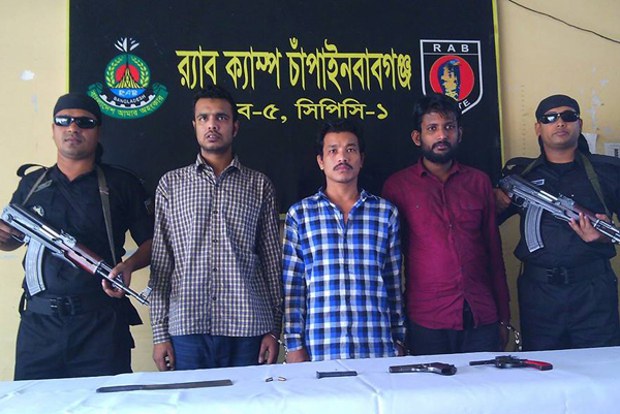Bangladesh: Suspects in Hoshi Murder Linked to Awami League, BNP
2015.11.13
 Three men charged with the shooting death of Japanese farmer Kunio Hoshi are paraded before reporters in Chapai Nawabganj, Bangladesh, Nov. 13, 2015.
Three men charged with the shooting death of Japanese farmer Kunio Hoshi are paraded before reporters in Chapai Nawabganj, Bangladesh, Nov. 13, 2015.
The three men charged Friday with the Oct. 3 shooting death of Japanese farmer Kunio Hoshi were active member of Bangladesh’s main political parties, which are bitter enemies.
The suspects were affiliated with the ruling Awami League or the opposition Bangladesh Nationalist Party (BNP), Rapid Action Battalion (RAB) commander Lt. Col. Mahbub Alam told a news briefing Friday in northwestern Chapai Nawabganj district, following their Thursday night arrest.
The suspects were identified as Rajib Hasan Sumon, (alias Meril Sumon), 28, Naoshad Hossain Rubel (alias Black Rubel), 36, and Kajal Chandra Barman, 32.
Officers with RAB, an elite police unit, captured the trio in Chapai Nawabganj, some 200 km (124 miles) from Rangpur city, where Hoshi was killed. Police recovered two handguns, bullets and machetes.
Youth leaders
Sumon and Rubel are leaders of the Rangpur city unit of the BNP’s youth front, Jatiyatabadi Jubo Dal, while Barman was a member of the ruling party’s youth front, the Jubo League, officials said.
“They have confessed to the killing during the initial interrogation,” said Alam, adding that the three had been on the move to evade capture.
Hoshi was killed less than a week after Italian aid worker Cesare Tavella was gunned down in a similar fashion on Sept. 28 in Dhaka’s diplomatic quarter.
According to SITE, the U.S.-based Jihadi monitoring group, the Islamic State (IS) terrorist group claimed responsibility for both killings. Home Minister Asaduzzaman Khan Kamal has since rejected reports IS has a presence in Bangladesh, and he has linked the killings to opposition parties.
The BNP and its ally, Bangladesh Jamaat-e-Islami, the minister said, have been involved in recent violence across the country – including the killings of the two foreigners – in order to foil the pending executions of two men convicted of war crimes committed during the 1971 war of independence. BNP leader Salahuddin Quader Chowdhury and former minister Ali Ahsan Mohammad Mojahid of Jamaat are facing execution for crimes against humanity committed 44 years ago.
Blame-game culture
Announcing the Oct. 27 arrests of four suspects in the killing of Tavella, Dhaka Metropolitan Police Commissioner Asaduzzaman Mia said that a “big brother” had hired the three killers and asked them to kill a foreigner to create anarchy in the country.
On Oct. 28, Khan identified the “big brother” as M.A. Qayyum, a BNP leader and a former Dhaka City Corporation commissioner.
Qaiyum’s brother, M.A. Matin, was arrested for his alleged complicity in the Tavella murder.
But BNP chairman Khaleda Zia, who is staying in London with her self-exiled son, Tarique Rahman, told journalists that the Awami League had been involved in all of the killings.
“The main problem of our politics is the culture of the blame-game between the Awami League and the BNP. Whenever something serious happens in Bangladesh, the parties start blaming each other,” Brig. Gen. Sakhawat Hossain, a former election commissioner, told BenarNews.
“If such a practice goes on, the real culprits may be spared,” he added.







